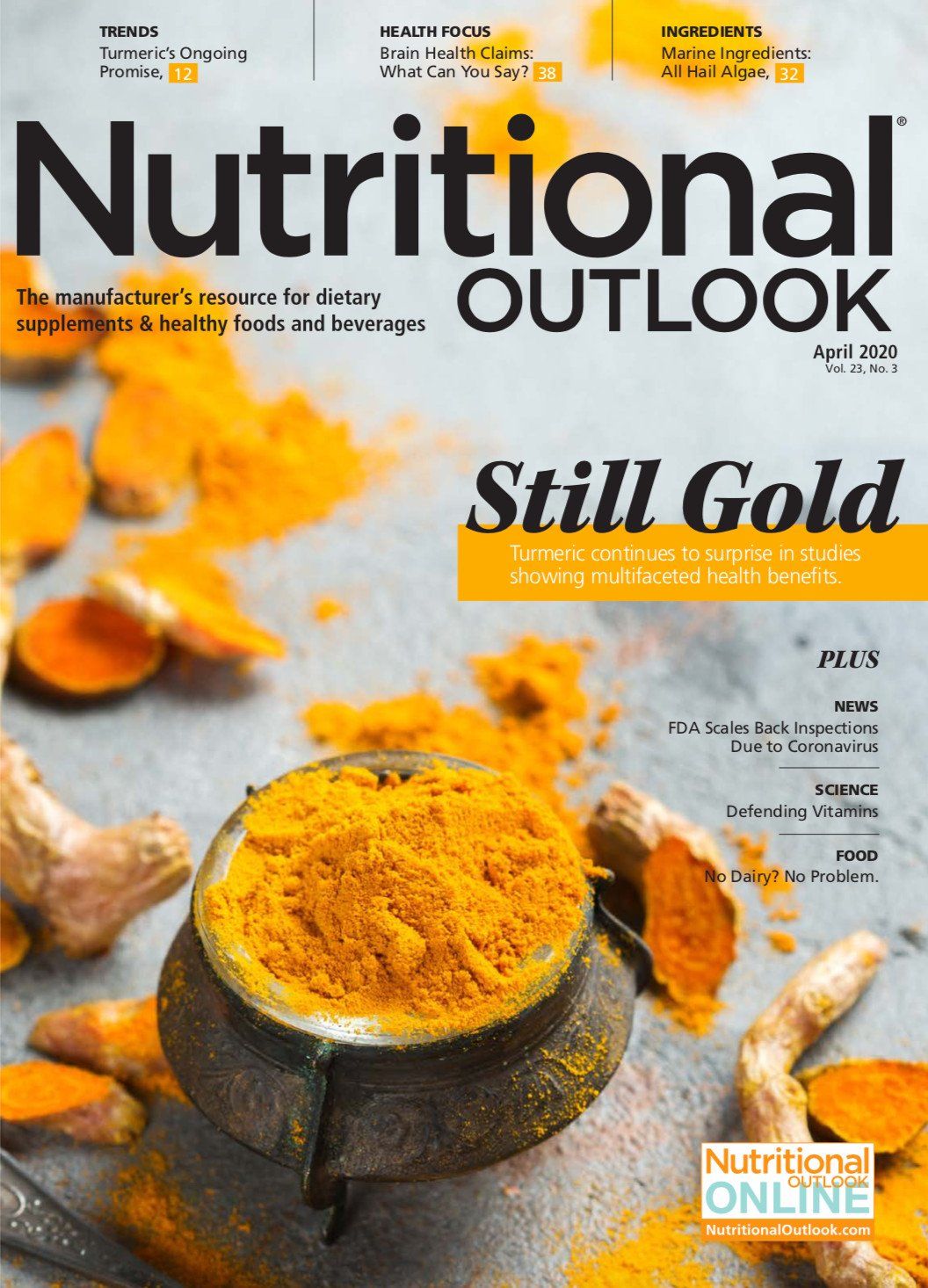Algae is a growing health and nutrition solution with sustainable benefits
Marine ingredients like algae and their derivatives possess potential that has other nutraceuticals green, red, and brown with envy.
Photo © Katatonia - Stock.adobe.com

The marine ingredients market is flourishing as consumers look for natural, clean sources of protein and other nutrients that weigh less on their conscience when it comes to environmental concerns.
Increasingly aware and conscious of what supplements they are putting in their bodies, more and more consumers are making choices that support healthier lifestyles and align with their personal values and preferences, according to Juliana Erickson, senior marketing manager, consumer health & nutrition, Lonza (Morristown, NJ). As a result, they are demanding cleaner, more natural, and sustainable products that reflect these aspirational ideals-such as marine ingredients, thanks to their natural, non-GMO, plant-based, and sustainability credentials.
Kim Edwards, MBA, CPMM, global product manager, Kemin (Des Moines, IA), has a similar view. “Marine ingredients, especially algal-based ingredients, are a natural fit for consumers who are increasingly health-minded and focused on protecting the environment. We have seen significantly more interest in higher-protein, plant-based diets on a global basis,” she says.
Algae supplier Vesta Nutra (Indianapolis, IN), sees great potential in marine-derived nutrients and bioactive components, particularly for their medicinal characteristics and added health benefits, such as anticancer and anti-inflammatory activity.
Eyal Shalmon, CEO of Israel-based Yemoja, believes consumers are drawn to algae for their plant-based protein benefits. “Many people are becoming vegetarian and vegan, and protein sourced from marine algae can be a great substitute,” he says, adding that many secondary metabolites found in algae also act as antioxidant agents, which have found a nice home in antiaging cosmetics.
The Promise & Potential of Algae
As part of the “World in 50 Years” project from the publication Quartz, a recent article pondered whether algae could save the planet by changing the way we eat. “If you had to imagine what we will be obsessing over in 50 years, what would top your list? We put versions of that question to dozens of entrepreneurs, scientists, academics, and artists, including Richard Branson, Temple Grandin, Ian Bremmer, Ann Kim, and Bright Simons. From their 550 answers, some clear themes emerged. One such theme: Algae,” the article says.
Over thousands of years, algae have adapted and evolved in order to protect and sustain themselves in harsh and variable aquatic conditions. Because of this, Amanda Mackinnon, marketing and communications manager, Australia-based Marinova Pty. Ltd., says these extreme marine environments have necessitated the evolution of unique biosynthetic processes that give algae an abundance of nutrients and specialized bioactive compounds.
As far as algae’s benefits, Holly Reardon, brand strategist, human and animal wellness division, Acadian Seaplants (Nova Scotia, Canada), says there’s a lot to unpack, but a short list includes thyroid support, cell rejuvenation, anti-inflammatory activity, immune system enhancement, cholesterol reduction, and much more. “Seaweeds are known for multiple bioactives not found in terrestrial plants,” she says. “Although there are still many unknowns, there is growing evidence of their functional benefits stemming from the polyphenols, fucoidans, and dietary fibers, as well as the antioxidant and pigment properties of the plants.”
Speaking of fucoidans, Marinova’s Mackinnon points out that these components of seaweed are part of a complex natural defense mechanism for macroalgae, providing protection from viruses and bacteria in the water. “With the advancement of new technology, complex algal derivatives like fucoidan can now be isolated and extracted, giving rise to novel bioactive ingredients for nutritional and human health applications,” she says.
“Many marine ingredients, particularly seaweed and its derivatives, have a long history of use in various cultures for helping to address everything from inflammation and immunity through to gut health and oncology,” Mackinnon continues. “The ability to extract and isolate specific fractions of algae has provided these ingredients with exciting potential worldwide.”
Kemin’s BetaVia Complete, a proprietary strain of Euglena gracilis, is a naturally sourced, plant-based dietary ingredient that nourishes the immune system while providing health benefits for the respiratory and digestive tracts.
According to Kemin’s Edwards, this nutrient-rich microalgae fermentate contains greater than 50% 1,3-beta-glucans and 20% protein, along with many vitamins, minerals, and other bioactive compounds to support healthy living by priming the immune system, protecting against oxidative stress, supporting respiratory tract health, and contributing to digestive tract health.
Kemin put BetaVia Complete to the test in a recent clinical study published in Nutrients.1 This 90-day supplementation study investigated the effects of BetaVia Complete consumption by healthy, active individuals on symptoms of upper respiratory tract infection. At the study’s end, the researchers found that, compared to those in the placebo group, the group supplemented with BetaVia reported 3.3 fewer self-reported sick days, 70% fewer upper respiratory tract infections, and 80% lower overall severity of upper respiratory tract infection symptoms.
Targeting sports nutrition applications, Lonza’s Oceanix marine phytoplankton ingredient supports peak physical performance and facilitates an increased physiological response against oxidative stress to aid recovery. “Supplying high levels of superoxide dismutase (SOD), Oceanix harnesses all the natural goodness of marine phytoplankton (Tetraselmis chuii) in a small, concentrated dose of 25 mg/day, while also offering clean-label, natural, and sustainable credentials for consumers,” Erikson explains.
“In a pilot study involving 32 student athletes, 25 mg of Oceanix marine phytoplankton daily was found to significantly improve multiple biomarkers of exercise performance and recovery compared to baseline and control. These results, which may be attributable to high concentration of SOD, suggest that the Oceanix brand has potential benefits in helping to optimize performance during physical exertion, while also promoting faster recovery,” Erikson adds. This study has not been published.
Algae Health Sciences (Irvine, CA), a division of BGG, recently published a paper2 that reviewed head-to-head studies comparing astaxanthin from three different sources in animals and in vitro. In each case, the company says, astaxanthin from the algal species Haematococcus pluvialis proved significantly more efficacious and biologically active than either synthetic astaxanthin or astaxanthin from yeast called Phaffia.
More specifically, six animal studies tested the different forms for a variety of health benefits and found the algal-based form performed significantly better for a variety of health benefits such as increasing lifespan; treating skin cancer; preventing the formation of gastric ulcers; improving resistance to stress; improving exercise endurance; decreasing reactive oxygen species (ROS); and augmenting enzyme levels. Furthermore, two antioxidant studies found that algal astaxanthin has 14- to 90-times greater antioxidant activity than synthetic astaxanthin.
“In addition to these eight studies demonstrating superior efficacy and activity for algal astaxanthin, it’s important to understand that there are absolutely no human clinical trials we found demonstrating any health benefit or even safety for the alternative astaxanthin forms,” says Shawn Talbott, PhD, President of EQQIL (a clinical research organization), who was an author of the review paper.
Talbott adds that until clinical trials are published on synthetic astaxanthin and astaxanthin from Phaffia yeast showing efficacy and long-term human safety, his conclusion is that consumers should ensure that they’re supplementing with algal-based astaxanthin. “Algal astaxanthin has over 100 clinical trials showing efficacy, numerous human safety studies, and twenty years of consumer use in the market,” he says.
Also read:
Fish oil: Ingredient innovations expand product applications
Fucoidan for the future: Ensuring the sustainability of fucoidan
References:
- Malkanthi E et al. “Effect of a Euglena gracilis fermentate on immune function in healthy, active adults: A randomized, double-blind, placebo-controlled trial.” Nutrients. Published online December 3, 2019.
- Capelli B et al. “Astaxanthin sources: Suitability for human health and nutrition.” Functional Foods in Health and Disease, vol. 9, no. 6 (2019): 430-44


























